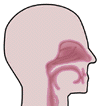  |
||
 |
It is commonly believed that as people grow older their ability to taste and smell becomes impaired. While there is some truth to this belief taste and smell loss in the elderly is not due primarily to aging but due mainly to some underlying medical process which inhibits their sensory functions. What makes this process even more disturbing is that loss of sensory functions interferes with interest in food. Eating becomes a chore, a burden, rather than something to enjoy. Mealtime may become something to fear or dread. There is no longer enjoyment but actual repulsion to put food into the mouth which has no taste or flavor. Chewing becomes work and swallowing has no appeal. How are these patients being evaluated at present? Unfortunately, not very well. Geriatric programs in the US deal with the multiple problems present in the elderly which relate mainly to their medical concerns and understandably so. Nutritional or sensory issues are much lower on the list of concerns but these issues form the basis of everyday living in the elderly and require as much insight and effort as attention to other more commonly understood medical issues. These sensory changes are becoming more relevant as the aged population grows in number. Loss of smell and taste in the elderly are complex issues. Loss of cognition in general, including memory loss, loss of awareness of time and surroundings, etc., are parts of problems encountered in early dementia associated with multiple neurological and metabolic processes including Alzheimer disease, Parkinsonism, vascular dementia, etc. Is it possible to separate out loss of taste and smell from other multiple changes in cognition associated with these disease processes? Elderly take multiple drugs for multiple systemic illnesses. We know that many of these drugs, anti-hypertensives, hormonal therapy, anti-depressives, inhibit taste and smell function. Is it possible to separate out the role of these drugs in the loss of taste and smell in the elderly? Do physicians recognize the contribution of these drugs to loss of taste and smell? Are the patients themselves cognizant of their own sensory losses since they may occur so slowly and surreptitiously that they occur without conscious awareness. I want to share with you an email I received from a man who recognized his father’s sensory loss but did not know what to do about it or where to go to get help:
This is an example of many emails and letters that I receive from patients and relatives of patients with problems of this type. Not only do these problems exist in individuals but also how many elderly in nursing homes have this problem? How many are coaxed to eat but cannot do so because of sensory lack not simply cognition lack? This problem cries out to the geriatric community for both awareness and help. “Ensure” is a band-aid used to treat a serious and complicated systemic problem that is not being presently addressed. It has never been formally addressed. Perhaps now is the time to do so since we now have discovered some of the biochemical causes of loss of taste and smell in the elderly and we are now prepared to treat these disorders provided physicians and the public recognize the importance and solvability of these problems. Two publications which will soon appear in the medical literature address this problem:
Home
| The Clinic | Diagnosis
| Treatment | FAQ
| Press
|
|